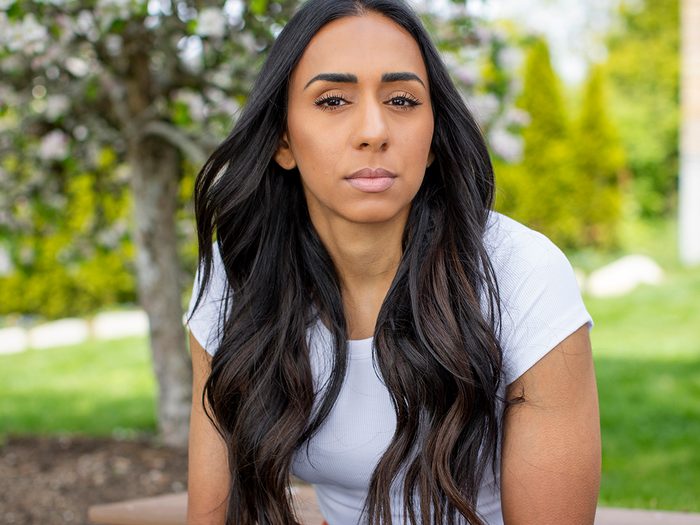“One Ob-Gyn Diagnosed Me with PCOS. Another Ob-Gyn Said I Didn’t Have It”

Sharan Scali, 31, shares her story about being diagnosed with polycystic ovary syndrome—and then finding out the cysts could be cancerous.
I’ve always experienced random bouts of bloating. I’m a personal trainer and nutritionist. I know it’s not normal for a 25-year-old girl to be walking around looking like she’s six months pregnant after eating. I went to many doctors who would do a basic test panel and tell me everything’s fine. I asked one doctor who specialized in women’s hormone health for an ultrasound, and she said, “No, all your testing is normal.” She made me fill out a mental health questionnaire. Then, one ob-gyn diagnosed me with polycystic ovary syndrome (PCOS). Another ob-gyn said I didn’t have it. At that point, I was very confused.
I’d been married for about three years when I decided to go to a fertility clinic. I didn’t even know if I wanted kids. I just wanted to know if I did have PCOS and if it would affect my chances of having children. At the fertility clinic, they asked if I wanted an ultrasound of my ovaries, which I’d never been offered before. As soon as they did it, they asked if I knew I had cysts growing on my ovaries. They said one ovary had a 12-centimetre cyst and the other a 10-centimetre cyst. Each ovary is only around two centimetres.
(Related: Here are the silent signs you may have polycystic ovary syndrome)
They said I would need a minor laparoscopic surgery. If I got pregnant with those cysts, it would be a big complication. They said there was no rush, so I went on vacation and had my phone off for a couple of weeks. When I turned my phone on at the airport, there was a message to call the clinic immediately about test results. They said the ovarian cysts might be cancerous. And if a cyst burst, I could lose my ovaries completely. I went to the surgeon and was put on an eight-month wait-list—with these potentially cancerous cysts on my ovaries.
I have a very active job, for which I use my body every single day. I was told not only that any movement could cause these ovarian cysts to burst, but also that nothing needed to be done immediately.
(Related: One woman shares what she learned about how heart disease affects women differently than men.)
I started to have bad pressure and pain; I couldn’t sleep through the night. I’d wake up to pee every hour because everything was just pushed so hard in my stomach. About a month after I saw the surgeon, I went to an ER. They put me on painkillers and said they were going to do emergency surgery. I had suffered some trauma to my ovaries from ovarian torsion. They rushed me into surgery and saved my ovaries. But my menstrual cycle never came back. So I ended up back at the fertility clinic. They said if I wanted to have a kid, I needed to start trying now. We ended up going the IVF route. I went from being a healthy 25-year-old who didn’t know if she wanted kids to pushing for IVF right at 27. That was three years ago. I’m finally 15 weeks pregnant.
It’s been a really hard couple of years. It’s something I haven’t been able to open up to anyone about. But by sharing my story, I hope more people can start to take the initiative when they know something is wrong. Don’t trust what other people say about your body. You know it best.
This essay is part of a larger package looking at women’s health gaps in Canada from our June/July 2021 print issue. Read more:
Women’s Health Collective Canada Is Addressing the Gap in Women’s Health
“For All Those Years, No One Told Me Anything”
“The Uncertainty Was a Big Piece. And I Couldn’t Get Answers”
Get more great stories delivered straight to your inbox by signing up for the Best Health Must-Reads newsletter. Subscribe here.




